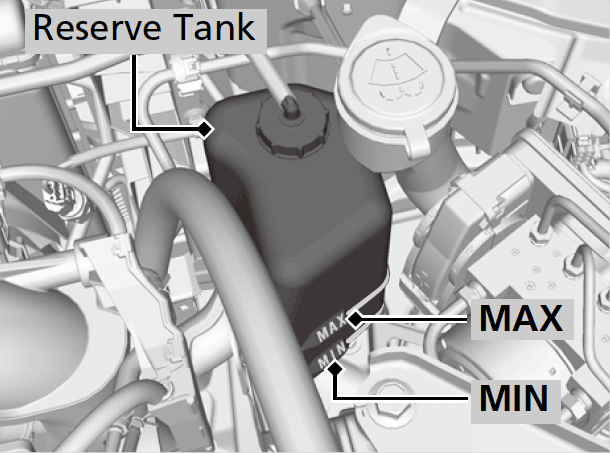How to Handle Overheating
Overheating symptoms are as follows:
- The temperature gauge is at the H mark or the engine suddenly loses power.
- The Engine temperature too hot. Do not drive. Allow engine to cool. message appears on the driver information interface.
- Steam or spray comes out of the engine compartment.
- WARNING
-
Steam and spray from an overheated engine can seriously scald you.
Do not open the hood if steam is coming out.
- WARNING
-
Removing the radiator cap while the engine is hot can cause the coolant to spray out, seriously scalding you.
Always let the engine and radiator cool down before removing the radiator cap.
- Detail
-
NOTICE
Continuing to drive with the temperature gauge at the H mark may damage the engine.
Continuing to drive with the Engine temperature too hot. Do not drive. Allow engine to cool. message on the driver information interface may damage the engine.If the coolant is leaking, contact a dealer for repairs.Use water as an emergency/temporary measure only. Have a dealer flush the system with proper antifreeze as soon as possible.
First thing to do
- Immediately park the vehicle in a safe place.
- Turn off all accessories and turn on the hazard warning lights.
- No steam or spray present: Keep the engine running and open the hood.
- Steam or spray is present: Turn off the engine and wait until it subsides. Then, open the hood.
Next thing to do
-
- Check that the cooling fan is operating and stop the engine once the temperature gauge goes down.
- If the cooling fan is not operating, immediately stop the engine.
- Once the engine has cooled down, inspect the coolant level and check the cooling system components for leaks.
- If the coolant level in the reserve tank is low, add coolant until it reaches the MAX mark.
- If there is no coolant in the reserve tank, check that the radiator is cool. Cover the radiator cap with a heavy cloth and open the cap. If necessary, add coolant up to the base of the filler neck, and put the cap back on.
- Check that the cooling fan is operating and stop the engine once the temperature gauge goes down.
-

Last thing to do
Once the engine has cooled sufficiently, restart it and check the temperature gauge.
If the temperature gauge has gone down, resume driving. If it has not gone down, contact a dealer for repairs.
- Recommended topic(s)

